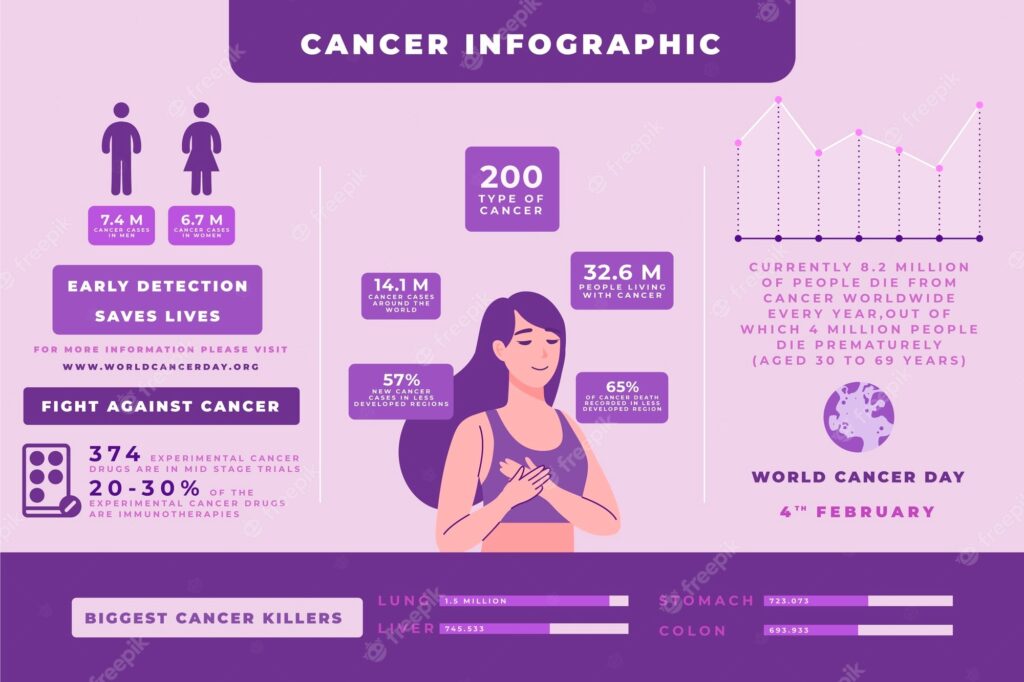
Cancer, a dreaded disease known for its aggressive nature, has various treatment options. However, one aspect that often gets overlooked is the vital role nutrition plays in managing cancer, particularly in the initial stages. With a balanced diet and proper nutritional intake, cancer patients can enhance their ability to tolerate treatment, counter side effects, and improve their overall quality of life. In this article, we delve deep into the significance of nutrition in cancer management, spotlighting its impact on different types of cancer and treatment stages.
Nutrition: A Key Player in Cancer Management
Nutrition is the unsung hero in a cancer patient’s treatment journey. It serves as the body’s fuel, providing the necessary energy for cell growth and the maintenance of vital functions. Nutrients such as proteins, vitamins, and minerals support healthy cell growth and fortify the immune system, which is crucial in fighting off infections and promoting healing.
Research shows that cancer patients who meet their nutritional requirements during treatment are more likely to tolerate their doctor’s recommended chemotherapy or radiation therapy doses. Good nutrition can also reduce the impact of common side effects, including fatigue, nausea, and weakness. Moreover, avoiding significant weight loss during treatment promotes faster recovery once the treatment is completed.
The Importance of Individualized Nutritional Counselling
Nutritional counselling plays a significant role in the cancer treatment journey. It lends a helping hand to patients, guiding them towards a diet that will meet their nutritional needs and boost their overall health.
Cancer patients have unique needs, and their diet should reflect this. Factors such as weight, existing medical conditions, activity level, lifestyle habits, budget, symptoms, food preferences, and food-related concerns should all be considered when designing an individualized diet. This tailored plan should contain the recommended amounts of protein, calories, vitamins, and minerals.
A dietitian or nutrition professional can provide individualized dietary counselling, taking into consideration these factors. They can advise on manageable portions, frequent small meals every two to three hours, and the importance of hydration. This approach empowers the patient, giving them a sense of control over their diet and potentially improving their quality of life.
The Impact of Nutritional Intervention on Treatment
Nutritional intervention can significantly impact a cancer patient’s ability to manage their treatment. By providing the body with vital nutrients, patients can maintain their energy levels, muscle mass, and healthy body weight. This, in turn, can improve their response to treatment and reduce the risk of adverse side effects.
Nutritional intervention strategies need to be tailored to the patient’s medical history, type and stage of cancer, and how they respond to treatment. If the patient can eat and has a functional gastrointestinal tract, nutritional counselling, with or without Oral Nutritional Supplements (ONS), should be the chosen intervention to address altered nutritional demands due to treatment or disease.
The Role of Artificial Nutrition in Cancer Treatment
When oral nutrition is inadequate or insufficient, artificial nutrition should be considered. This could be in the form of enteral nutrition (EN) or parenteral nutrition (PN). The decision between EN and PN must take into account the site of the tumour, its extent, complications, treatment plan and intent, prognosis, patients’ overall physical status, and the duration of the nutritional support.
EN is preferred if the intestinal functions are preserved. This is to maintain gut integrity and reduce bacterial translocation. However, when EN is insufficient or contraindicated, a combination of EN and PN or PN alone should be considered.
The Crucial Connection Between Nutrition and Treatment Types
The patient’s type of cancer and treatment method can significantly influence nutrition recommendations. Certain cancers, such as esophageal, pancreatic, and non-small cell lung, usually cause patients to have higher calorie needs than other cancer types like breast, prostate, and colon.
For patients undergoing chemotherapy, radiation therapy, or surgery, the nutritional needs and recommended diets are likely to vary during different phases of treatment. For instance, due to swallowing difficulties, a predominantly liquid diet is often necessary for head and neck cancers.
The Importance of Maintaining Hydration During Treatment
Hydration is as essential as nutrition during chemotherapy. It is crucial to maintain the body’s fluid balance to prevent dehydration, a common side effect of many chemotherapy drugs. Dehydration can lead to various health complications, including urinary tract infections and kidney stones, and may cause treatment delays or dose adjustments.
Patients are advised to drink at least eight cups of water a day to stay hydrated. However, the exact amount may vary depending on the patient’s body weight and specific needs.
The Influence of Nutrition on Survivorship
Good nutrition doesn’t just play a role during cancer treatment but continues to be critical in the survivorship phase. As patients regain their appetite following treatment, incorporating a healthy diet into their daily lifestyle can help reduce the risk of cancer returning.
Moreover, a healthier lifestyle may also help manage or prevent other chronic illnesses, such as heart disease or diabetes. Thus, the benefits of developing healthier eating habits during treatment can carry over into survivorship, potentially improving the quality and length of life for some cancer survivors.
Warning Signs of Malnutrition and Dehydration
Despite trying to eat well and stay hydrated, cancer patients may still experience malnutrition and dehydration due to conditions caused by the cancer itself and side effects of treatment. Warning signs that may indicate a need for nutritional and hydration intervention include weight loss, inability to eat or drink as usual, difficulty or painful swallowing, new swelling in the ankles or eyes, constipation, diarrhea, a decline in energy or activity levels, and coughing that develops when eating.
Nutritional Support: A Key Component of Cancer Treatment
Nutritional support is a vital component of cancer treatment. It is essential to monitor patients regularly for signs of malnutrition and dehydration and to prevent these issues proactively. Nutritional support can be provided through various means, including individualized counselling, artificial nutrition, and the management of treatment side effects.
At the end of the day, good nutrition is a powerful ally in the fight against cancer. By maintaining a balanced diet and ensuring proper nutritional intake, cancer patients can enhance their resilience, improve their response to treatment, and set the stage for a healthier, stronger future.

